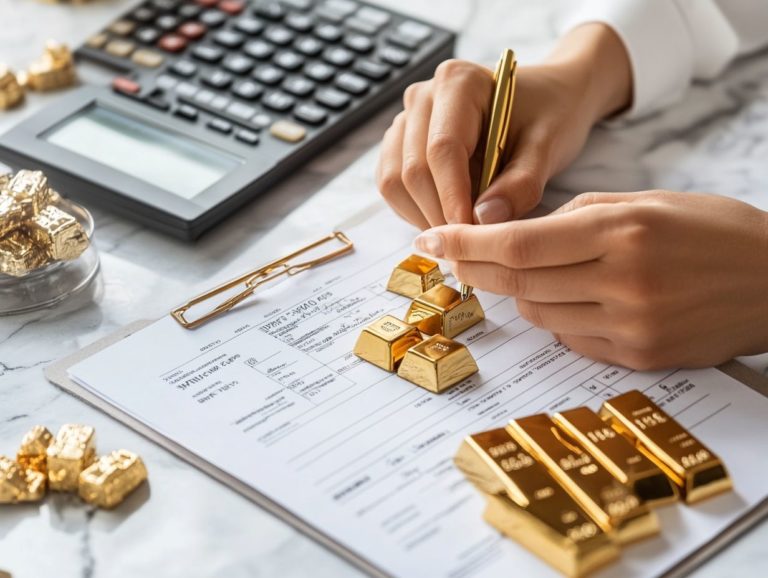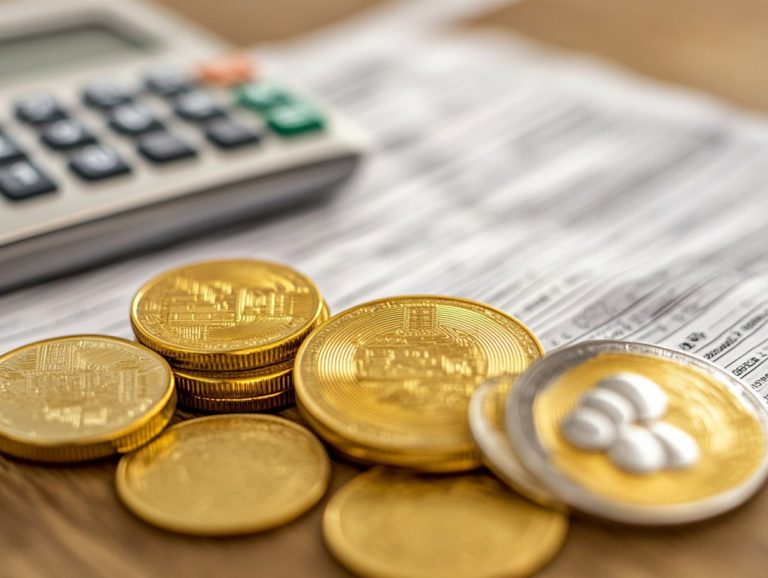Tax Implications of Importing and Exporting Precious Metals
Navigating the world of precious metals importing and exporting can be a complex yet rewarding endeavor for you.
From grasping the essential definitions and processes involved to understanding the tax implications tied to these transactions, every step you take is vital. This article delves into the customs duties and taxes that come into play when you bring precious metals into your country, as well as the regulations governing their export.
You ll also discover key considerations for international transactions, including currency exchange, along with effective strategies to minimize your tax liability. Whether you re a seasoned trader or just starting out, this guide offers valuable insights to enhance your understanding and decision-making in this dynamic market.
Contents
- Key Takeaways:
- Overview of Precious Metals Importing and Exporting
- Tax Implications for Importing Precious Metals
- Tax Implications for Exporting Precious Metals
- Considerations for International Transactions
- Strategies for Minimizing Tax Liability
- Frequently Asked Questions
- What are the tax implications of importing precious metals?
- Do I have to pay taxes on the export of precious metals?
- Are there any exemptions for taxes on precious metal imports?
- Are there tax implications for investing in precious metals?
- What happens if I don t pay taxes on precious metal transactions?
- How can I minimize the tax implications of these transactions?
Key Takeaways:
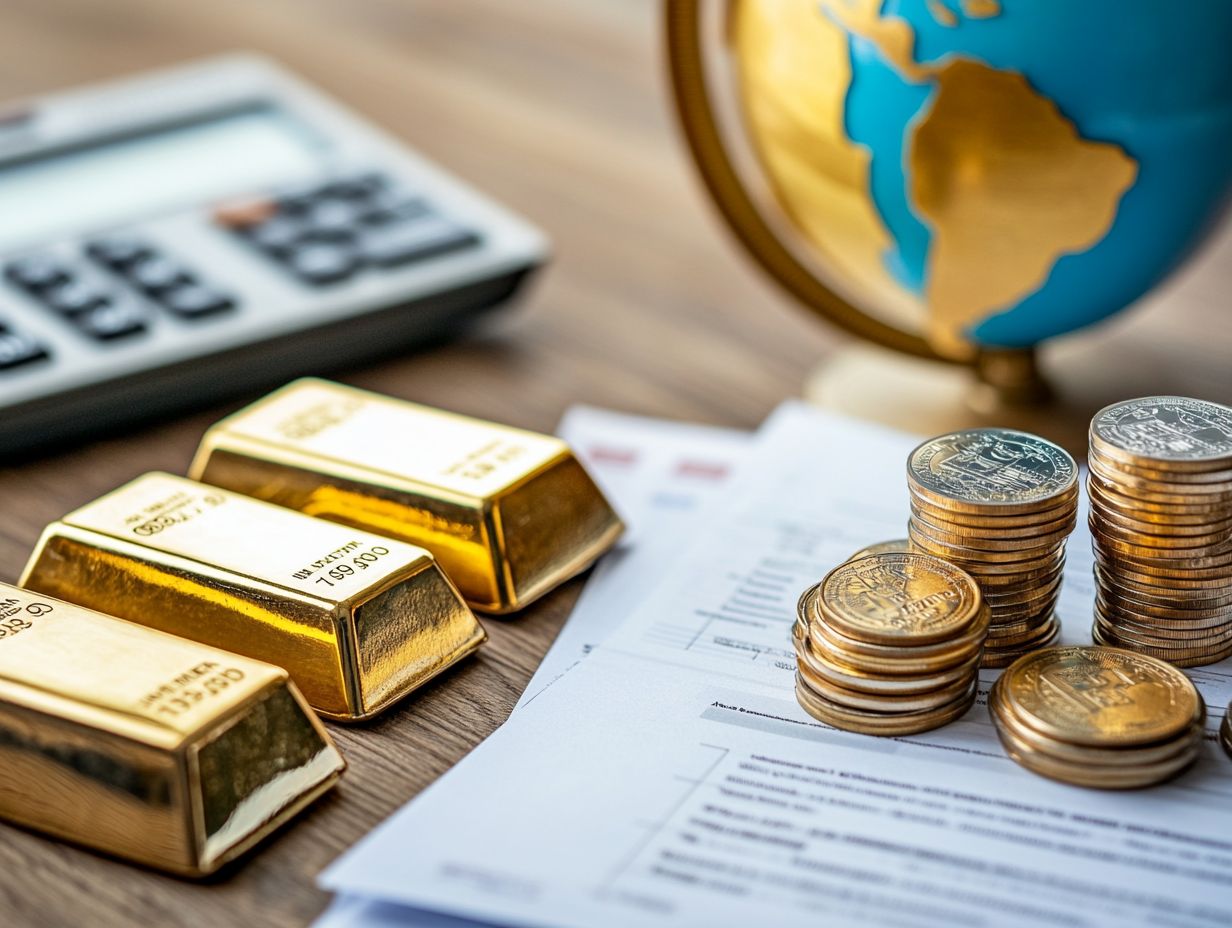
- Precious metals importing and exporting involves various taxes and regulations that must be carefully considered.
- Import taxes, export taxes, customs duties, and currency exchange rates can significantly impact your tax liability on precious metals transactions.
- Strategies such as properly valuing the metals and utilizing tax deductions can help minimize your tax liability on international transactions.
Overview of Precious Metals Importing and Exporting
The import and export of precious metals, including gold and silver, play a crucial role in global trade, influencing investors in many ways, from capital gains to trading costs.
This intricate process is governed by a range of regulations and guidelines that can vary significantly between regions, such as North America and Australia.
As an investor, you may find it beneficial to utilize financial securities like ETFs to tap into market value fluctuations. It s important to stay acutely aware of the IRS implications that could affect your investment returns.
Definitions and General Process
Importing and exporting precious metals involves clear steps designed to facilitate trade across borders. Metals like gold and silver are vital assets in the investment landscape.
To understand these rules, you must be aware of the various regulations governing these transactions, including customs duties (taxes imposed on imported goods) and import/export licenses, which can vary significantly from one country to another.
Proper documentation including certificates of authenticity, invoices, and shipping manifests is essential for ensuring a seamless transfer of these high-value goods.
Market dynamics play a critical role; fluctuations in metal prices can influence not only the profitability of your trade but also the timing and methods employed in both importing and exporting. Get ready to grasp these key elements for a successful trading experience!
Tax Implications for Importing Precious Metals
Understanding the tax implications of importing precious metals is vital if you want to thrive as an investor aiming to navigate the intricate landscape of capital gains and IRS regulations governing these transactions.
Customs Duties and Other Taxes
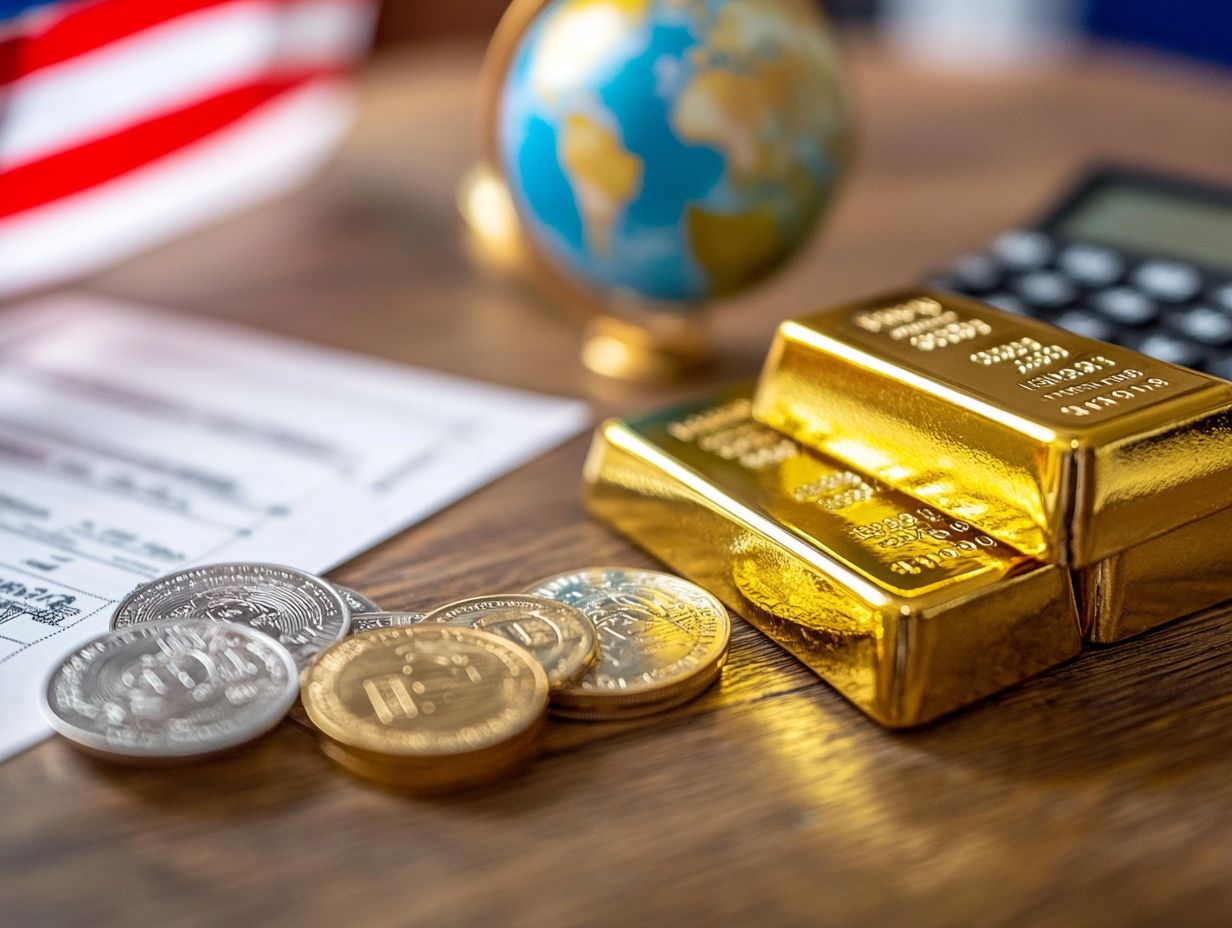
Customs duties and other taxes are pivotal considerations for you as an investor when importing precious metals. These financial factors can significantly influence both the overall cost and the market viability of your investments.
These obligations can vary widely based on the type of metal and the country of origin. For example, tariffs on gold and silver may differ, which can directly impact your trading strategies. Additionally, understanding the tax implications of buying and selling precious metals is crucial for making informed decisions.
Value-added tax (VAT) and excise taxes can also complicate your finances, resulting in higher upfront costs and altering your profit margins. Understanding these elements is crucial for any trader, as even minor fluctuations in duties can sway market conditions and determine whether imports are a savvy choice in the current economic climate.
Tax Implications for Exporting Precious Metals
Exporting precious metals has unique tax implications, especially regarding capital gains. Be mindful of regulatory scrutiny from organizations like the IRS; this can impact your overall return on investment.
Export Taxes and Regulations
Export taxes and regulations shape the trading landscape for precious metals. They dictate how these valuable assets can be transported internationally.
These obligations can influence pricing structures and the overall supply chain. If you plan to export, know that countries with higher export taxes may deter potential exporters.
This can lead to reduced availability in global markets. On the other hand, nations with favorable tax regulations can attract foreign investments.
Understanding these nuances is crucial for you as an investor. They can shift your strategies and guide you to regions with better trading conditions.
Staying informed about regulations is key to navigating the volatile world of precious metal trading.
Considerations for International Transactions
When engaging in international transactions involving precious metals, consider various factors. These include currency exchange rates, market fluctuations, and the broader investment climate.
Currency Exchange and Other Factors
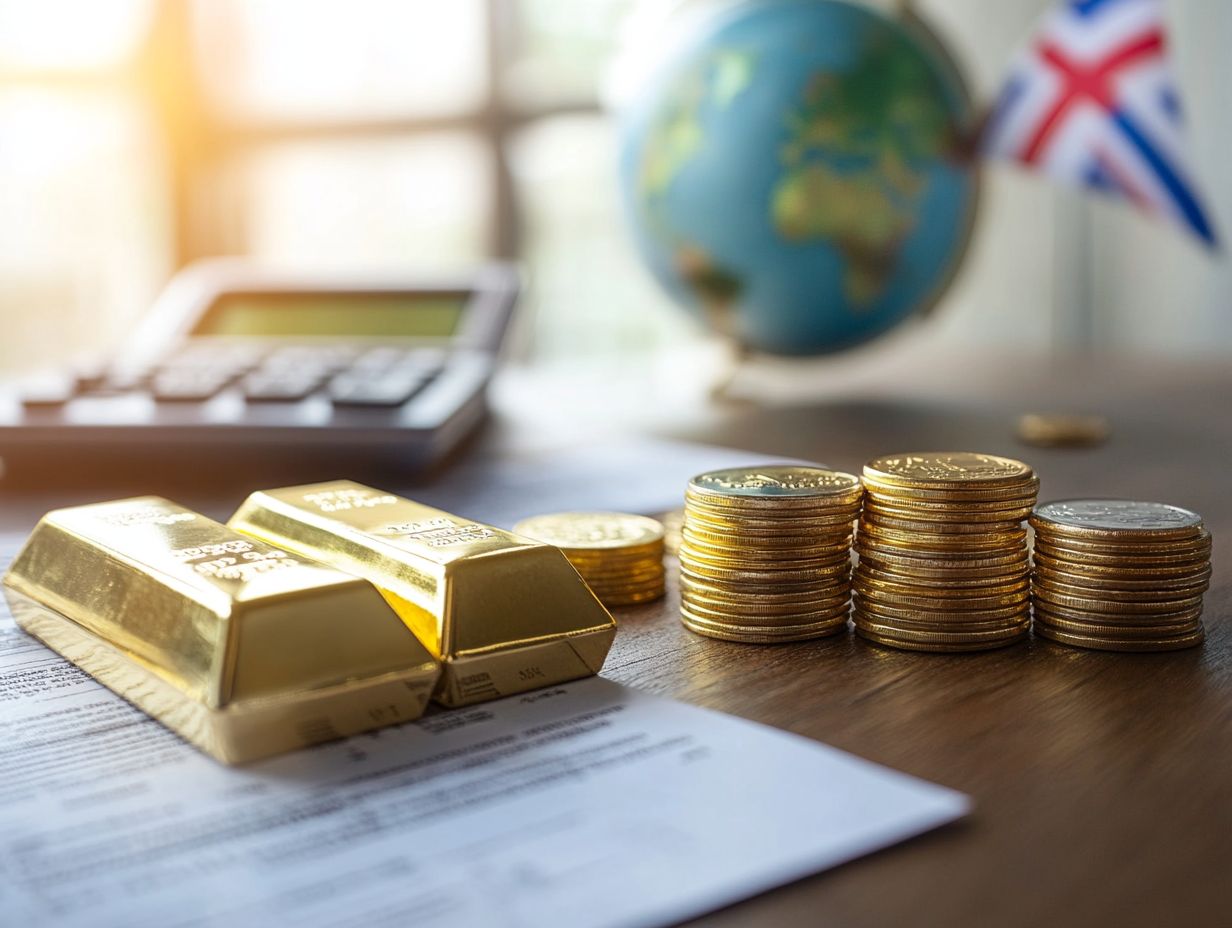
Currency exchange plays a key role in international transactions of precious metals. It influences both costs and the profitability of your investments.
Be aware that currency fluctuations often affect your pricing strategies. When the U.S. dollar strengthens, gold and silver prices may decline, making these assets pricier for foreign investors.
Market volatility driven by geopolitical tensions can complicate trading dynamics. Keep an eye on currency valuations.
This complex interplay creates a challenging environment. You must continuously assess currency movements alongside external factors.
Strategies for Minimizing Tax Liability
Effective strategies to minimize tax liability are essential for you as an investor in precious metals. This allows you to maximize your investment returns while navigating tax regulations.
Tips for Reducing Taxes on Precious Metals Transactions
Finding ways to reduce taxes on precious metals transactions can yield significant financial advantages. Familiarize yourself with strategies that optimize your tax situation.
Pay close attention to IRS guidelines for collectibles like gold, silver, and platinum. Maintain precise records of purchase prices and sale dates for reporting gains or losses.
Consider holding precious metals in tax-advantaged accounts like IRAs. This can provide substantial tax relief by deferring taxes on gains until withdrawal.
Consulting a tax professional specializing in precious metals can help reveal tailored strategies to align with your investment goals.
Frequently Asked Questions
What are the tax implications of importing precious metals?
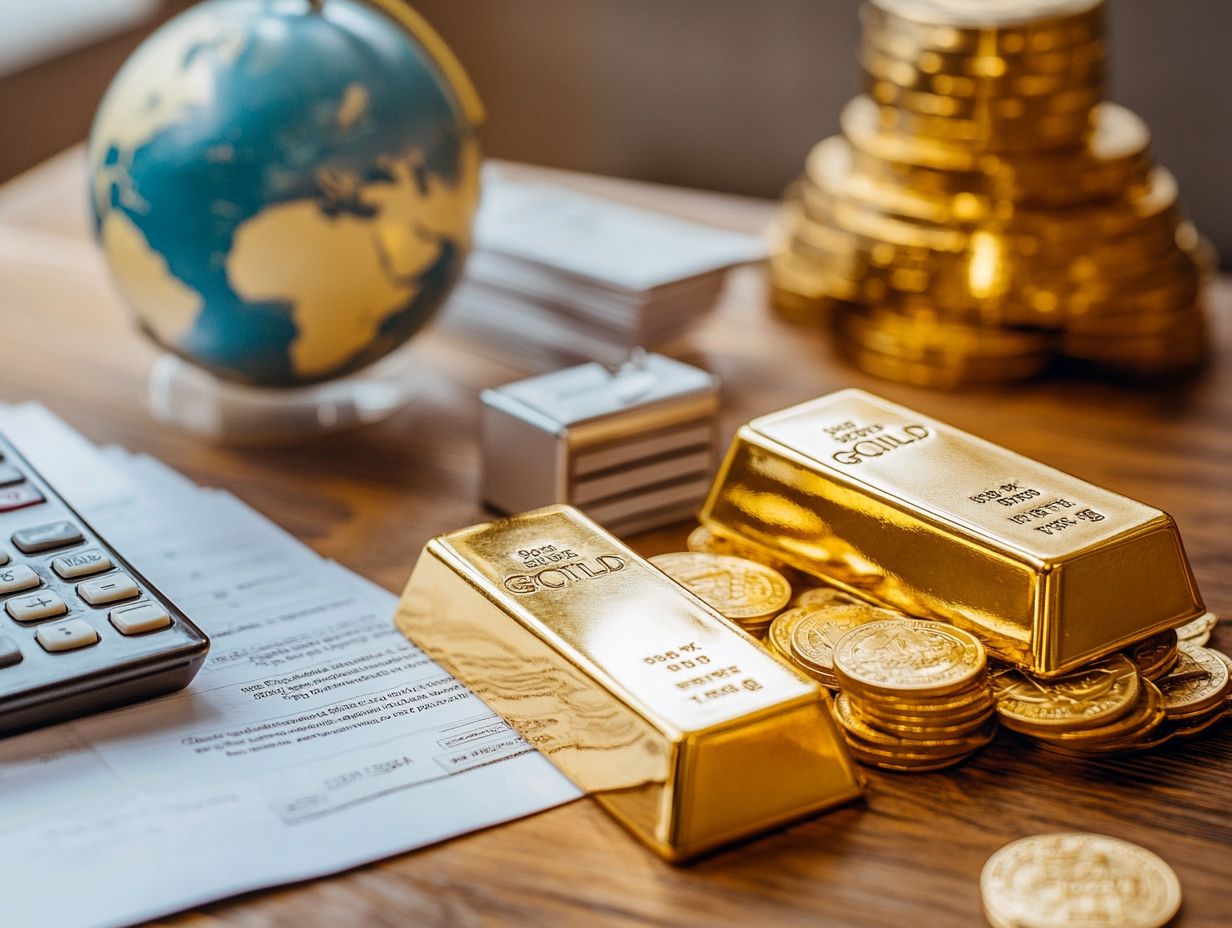
Tax rules for importing precious metals differ by country. You typically need to pay import taxes, which can be anywhere from 0% to over 10% of the value of the metals.
Do I have to pay taxes on the export of precious metals?
Yes, exporting precious metals involves taxes too. The specific duties depend on your country of export and the destination.
Are there any exemptions for taxes on precious metal imports?
Some countries may exempt certain imports, like metals for industrial use. Research local laws to discover potential savings.
Are there tax implications for investing in precious metals?
Investing in precious metals can lead to specific taxes and reporting obligations. Always consult a tax expert before making investment decisions.
What happens if I don t pay taxes on precious metal transactions?
Failing to pay taxes can lead to fines, penalties, or legal action. Always declare and pay the necessary taxes to avoid trouble.
How can I minimize the tax implications of these transactions?
Minimize tax implications by understanding the laws of involved countries. Consulting a tax professional can help you identify any available exemptions.










